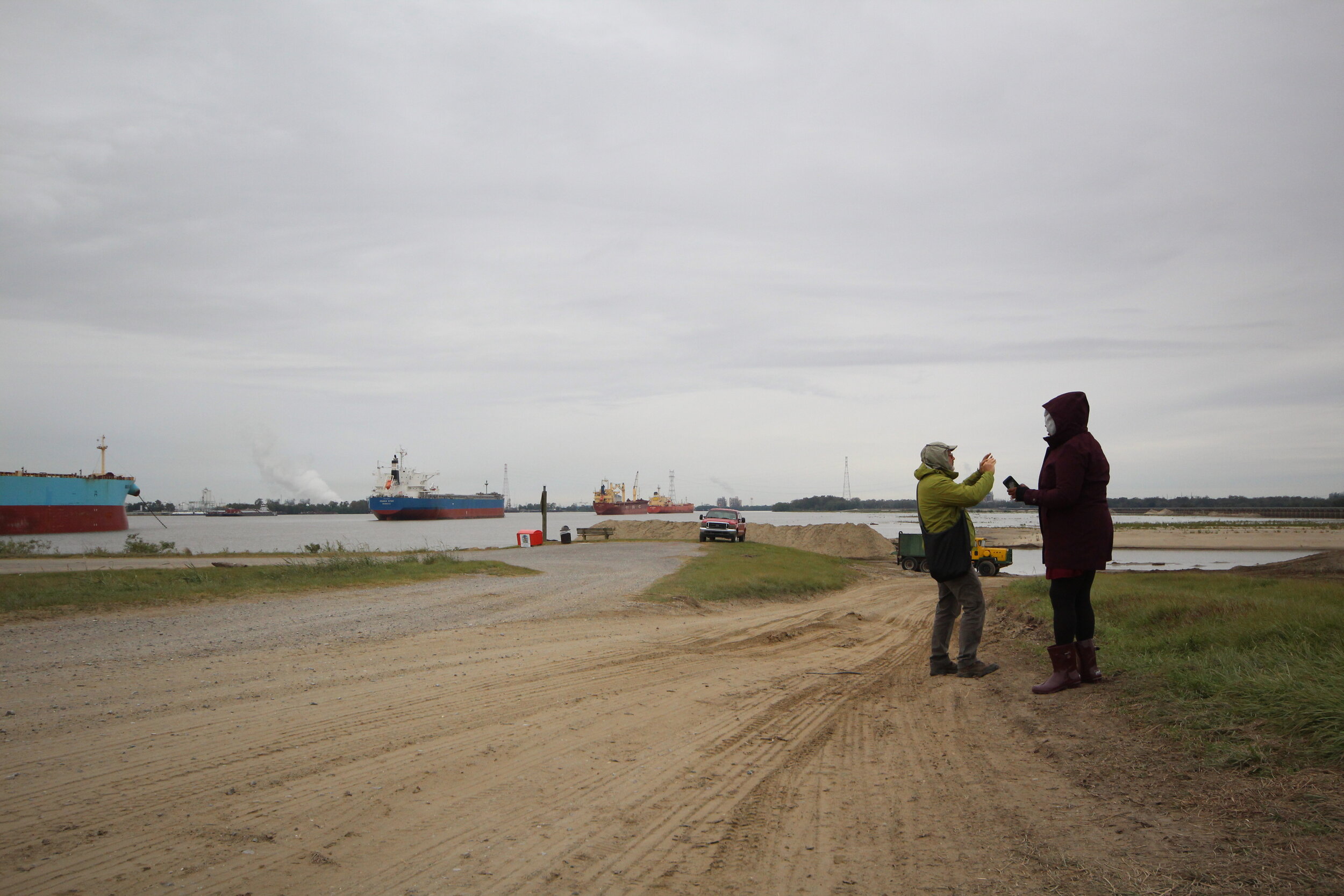Changing Course: Reflections on Education and Practice in a Dominated Delta
Map of the Bonnet Carre Spillway, with notation from a session participant marking cemeteries used by people enslaved on plantations and their descendants, which had been unmarked on the map
The Mississippi River delta is a dominated environment. Our ecological and cultural landscapes have been shpaed by systems which represent the worst of humanity, what writer and cultural critic bell hooks calls the White supremacist capitalist colonialist cisheteropatriarchy, or ‘the system of domination’. As professionals trained in a wide variety of physical, environmental and social science fields, participants in the Un/bounded Engineering and Evolutionary Stability seminar of the Anthropocence River Campus hosted by Tulane University, Haus der Kulturen der Welt (HKW) and the Max Planck Institute for the History of Science are poised to perpetuate these systems. If they are to do otherwise, it is necessary to change course.
To change course requires deconstructing the systems of domination which oppress the Mississippi as a river, and the human, animal, plant and microbial societies which make up the Delta. Through approaches like the multispecies ethnography practiced by seminar co-facilitator Nikiwe Solomon of the University of Cape Town and social network theory-informed approach of New Orleans consultant Tanya James, facilitator and founder of Strategic Outcomes, it is possible to see how the humans who occupy its banks are entangled in all these systems. This includes those of us who may be professionally educated, despite our efforts to frame ourselves as objective observers. We cannot begin to free the river, or ourselves, without an understanding of how these systems are constructed and our positionalities within them.
Like emissions and effluents, other forms of toxic pollution to which they are connected, the social toxins of these oppressive practices must be remediated through antiracist, feminist, decolonizing practice. Settler colonialism is not natural, but is an artificial creation; so are capitalism, Whiteness and maleness, biological fictions but deadly serious social realities. These are relationships into which we are socialized. Each was created and it is possible to challenge them. It is necessary that we do so, because they’re killing us, just as they are killing the river.
White supremacist capitalist patriarchal settler colonialism pollutes our minds and bodies. One symptom of this pollution is a blindness which allows people racialized as White, and who have achieved elite status, to dehumanize people racialized as Black, gendered female, and who are poor. Another symptom is the systemic amnesia which allows people racialized and socialized as White to lead professional fields without learning the histories of Indigenous people who are still fighting to exist on this land, or the Black people who were enslaved and were brought here to shape this landscape, harvest the sugarcane, indigo and cotton, and whose descendants to this day labor in Angola and the neo-plantation Louisiana Governor’s Mansion.
Domination is a form of social and political pollution with biological consequences. Racism makes people physically sick, degrading Black people’s immune systems through tension and stress. The emissions from chemical plants like those which pollute Black neighborhoods in Norco are racism in chemical form, which can be measured by the impact they have on Black and poor people who live across South Louisiana and the United States.
During the Unbounded Engineering seminar, James asked attendees to consider what professionals in these technical and scientific fields must do with this knowledge, and how participants can change their practices. Some answers can be found lie in the strategies used to produce the seminar’s final product, a collection of collaboratively produced collages. Elements of the technical and professional skills participants have been taught must be woven in with the histories, emotions, and physical presences they bring to the table.
We are professionally trained, but our professional identities are not the entirety of our existence. People racialized as White and gendered male are trained to ignore these particular identities and the ways they allow us to perpetuate practices of domination, luxuries unavailable to Black women and other women of color.
Rather than demand others ignore their identities, we must become more conscious of our own, and learn how to use our positions of power and privilege to elevate perspectives that are excluded, a practice which requires strategic collaboration, listening, and the ability to decenter ourselves. We must see how our landscape and our institutions are structured primarily for the comfort, success and survival of some people and not others, and work collaboratively to transform the systems that keep them that way. But we can only do this if we are able to talk and think about how our identities and particular histories, our emotions and experiences, affect our work.
We must continually ask the types of questions James asked attendees of the seminar to consider: “Why are we doing this? Who is it for? Who is a part of these conversations? Who is not, and why?” We will find that there are many opportunities for productive and creative intervention in the systems keeping these toxic pollutants flowing. Changing course means preparing for challenge and disruption, allowing for ‘flows’ of emotion, context and expression, and remediating through antiracist, feminist practice the toxic pollutants that sicken our minds and shape the systems we design, just as we remediate chemical pollutants streaming from pipes and smokestacks.






